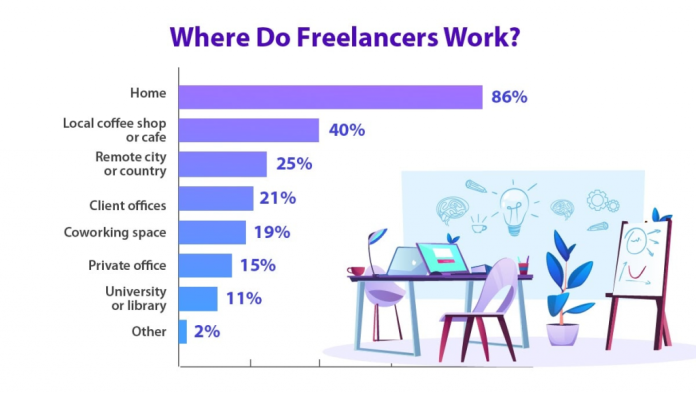Freelancing is a dynamic and transformative force in today’s global economy that takes economic empowerment beyond income growth. It’s an independent contract or gig work to offer your services, such as writing, graphic design, programming, marketing, etc., on a project or task basis.
This has removed distance limits and let freelancers from poor countries work with people worldwide. Beyond the economic advantages and skill enhancement of freelancing, noteworthy socio-economic benefits exist. Even women get the opportunity of remote work and can operate outside traditional employment structures, enjoying flexibility and autonomy in choosing projects, clients, and work schedules.
The Freelancing Landscape in Poor Countries
In poorer nations, a unique freelancing landscape is shaped by existing economic difficulties. These countries face ongoing economic challenges like scarcity, and traditional job opportunities are also bound by barriers. Some common barriers include:
● Qualification Requirements: Many traditional jobs have stringent educational or skill-related prerequisites. Thus, individuals who may possess valuable skills but need more formal qualifications are excluded.
● Geographical Limitations: Certain job opportunities are concentrated in specific regions. Securing employment is challenging for individuals in remote or less economically developed areas.
● Discrimination and Bias: Systemic issues related to gender, age, ethnicity, or other factors can contribute to discriminatory hiring practices, limiting opportunities for specific individuals.
● Inflexible Work Structures: Traditional employment follows rigid schedules and workplace structures. It poses challenges for individuals with caregiving responsibilities or those seeking more flexible work arrangements.
In response to these constraints, freelancing is a flexible and accessible means for individuals to utilize their skills and talents. Freelancers in low-income countries find a way to overcome geographical and institutional constraints.
Opportunities for Freelancers in Poor Countries
Freelancers in low-income countries benefit from a global job market accessible through digital platforms. These platforms break down geographical barriers so freelancers can reach international clients worldwide. A significant advantage is freelancing allows individuals in economically challenged regions. They can participate and showcase their skills without facing substantial obstacles. Moreover, the in-demand skills such as digital marketing, graphic design, and programming create valuable opportunities for freelancers in low-income countries.
Economic Impact of Freelancing
From an economic perspective, freelancing has a notable economic impact. It has opened up fresh channels for income generation. This adds to the country’s overall GDP and plays a pivotal role in decreasing unemployment rates. The contribution to local economies is evident through case studies highlighting freelancers’ success stories. These dynamics enlighten the broader economic impact of freelancing and its contribution to sustainable economic development.
Challenges and Solutions for Freelancers in Poor Countries
Despite the growing interest in freelancing, research indicates persistent challenges and barriers within the market and institutional landscape. Insufficient educational resources and a lack of awareness about skills can limit the competitiveness of freelancers in the global market. Implementing skill development programs, online education initiatives and partnerships with industry experts can empower freelancers by enhancing their skills and knowledge.
Insufficient infrastructure and high internet costs create barriers for freelancers. This limitation challenges freelancers to connect with clients and utilize online platforms effectively. Improving infrastructure and reducing costs are vital to empowering freelancers to participate more actively in the digital economy.
Amidst these, limited access to international payment gateways, currency conversion challenges, and high transaction fees can affect freelancers’ income. Introducing localized payment solutions, reducing transaction fees, and promoting awareness about secure payment practices can streamline financial transactions for freelancers.
Policy Implications for Freelancers
Several policies have successfully created mutually beneficial outcomes for both governments and freelancers. Examples include:
Lowering Tax Brackets for Selected Freelance Occupations:
Reducing tax rates for specific freelance sectors, such as engineering and arts, incentivises freelancers. It helps them to transition from informal work to formalized, taxable arrangements.
Subsidizing Social Contributions for New Sole Proprietorships:
As implemented in Serbia, subsidies for social contributions in the initial year of registration for sole proprietorships ease the financial burden for new businesses. This policy empowers freelancers to reinvest saved capital into scaling their businesses.
Access to Public and Social Services for Tax-Paying Freelancers:
Granting freelancers access to public and social services when they pay
Conclusion:
In summary, freelancing is an innovative pathway for developing globally digitalised countries’ economies and skills. It brings economic opportunities, enhances skills, uses technology smartly, and provides social and economic benefits. Freelancing is not merely a passing trend but a dynamic force for growth and innovation.
As the freelancing scene evolves, policymakers, educational institutions, and individuals must get on board. Embracing freelancing can make a positive impact on poor countries’ economies and society as a whole.




